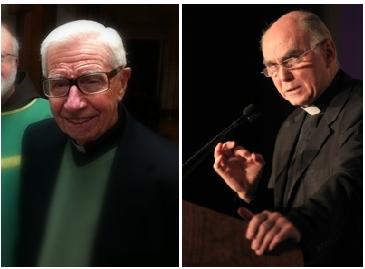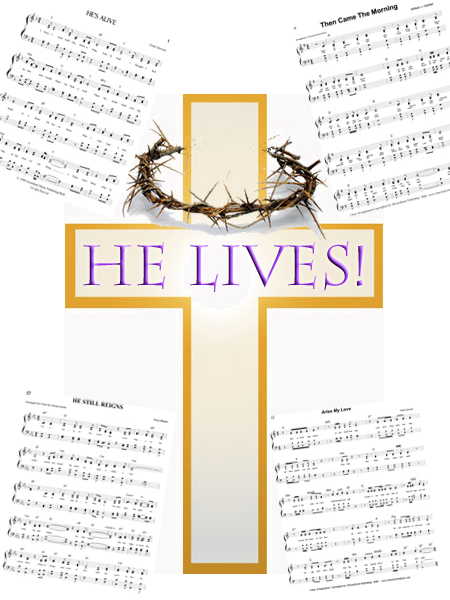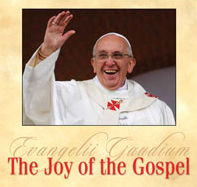 In his apostolic exhortation, Evangelii Gaudium, Pope Francis’ view of women is ambiguous, showing sympathetic acknowledgement of abuse (211, 212, 214) women often face, while also becoming entangled in stereotypical generalizations elsewhere (46-49,103,139-141, 284-288) where womanhood is always associated with motherhood. The Pope says that, “the legitimate rights of women to be respected, based on the firm conviction that men and women are equal in dignity, present the Church with profound and challenging questions which cannot be lightly evaded.” However, he then goes on to affirm that “the reservation of the priesthood to males, as a sign of Christ the spouse who gives himself in the Eucharist, is not a question open to discussion.”
In his apostolic exhortation, Evangelii Gaudium, Pope Francis’ view of women is ambiguous, showing sympathetic acknowledgement of abuse (211, 212, 214) women often face, while also becoming entangled in stereotypical generalizations elsewhere (46-49,103,139-141, 284-288) where womanhood is always associated with motherhood. The Pope says that, “the legitimate rights of women to be respected, based on the firm conviction that men and women are equal in dignity, present the Church with profound and challenging questions which cannot be lightly evaded.” However, he then goes on to affirm that “the reservation of the priesthood to males, as a sign of Christ the spouse who gives himself in the Eucharist, is not a question open to discussion.”
The Pope also says, “it can prove especially divisive if sacramental power is too closely identified with power in general.” He also notes that the idea that ordination simply confers power not only robs the Church of valuable contributions from women, it presents a misguided view of the priesthood and the sacraments. “The configuration of the priest to Christ the head – namely, as the principal source of grace – does not imply an exaltation which would set him above others,” Pope Francis writes. “In the Church, functions do not favor the superiority of some vis-a-vis the others.”
Perhaps, a problem lies in the fact that the Roman Catholic Church’s organizational structure, with the Pope as head, is a hierarchical structure and, no matter what he says about power not being “understood as domination, but the power to administer the sacrament of the Eucharist,” the exclusion of women based on their gender from being a member of the priesthood, and hence from decision making, seems to many women and men to be a problematic distortion of power.
The Pope acknowledges that “we need to create still broader opportunities for a more incisive female presence in the Church,” including “the possible role of women in decision-making in different areas of the Church’s life.” But within a hierarchical structure what does this actually mean? Women may lead Religious Education in a Parish, the Outreach Program, perhaps even the Finance Committee, but the priest is always the boss and, according to the Pope, the boss will always be male.
If we look to the Bible, we can find a very different description of the relationship between men and women. In the Gospels, for example, women are often key figures in the evolution of Jesus’ mission. Mary’s ‘Fiat’ and ‘Magnificat’ are key to any understanding of discipleship; her giving birth to Jesus is akin to the moment of Consecration at Mass as she brings Jesus to the world. Elizabeth’s understanding and joy as she welcomes Mary, recognizing the baby in Mary’s womb as her ‘Lord’ without doubt or hesitancy, is the blueprint for all followers of Christ. Anna heralds Jesus. Mary encourages Jesus to begin His mission at Cana. The Syrophoenician woman challenges Jesus’ understanding of His mission. The Samaritan woman is the first person to hear Jesus say He is the Messiah and she is the first missionary. A woman anoints Jesus for His burial while His apostles are still arguing about who will be the greatest. Martha declares that Jesus is the Messiah. Women support the itinerant disciples and accompany Jesus to Jerusalem and the Cross. Women are the witnesses to (and thus the link between) His death, burial and resurrection. Mary Magdalene is the Apostle to the Apostles. Women receive the Holy Spirit along with men at Pentecost. St. Paul talks of the key leadership roles played by Prisca, Lydia, Phoebe, Chloe, and many other women. Obviously motherhood is not the only role women fulfilled in the early Church.
Interestingly Jesus said, “For whoever does the will of My Father in heaven is My brother and sister and mother” (Matt 12:50) and “blessed are those who hear the word of God and observe it” (Luke 11:28). Mary is the mother of God, but what is most important about her is that she did the will of Jesus’ Father in heaven; she heard the word of God and observed it. Mary is important because she was a disciple and did what was asked of her.
In conclusion, where does Evangelii Gaudium leave women? I suggest that the Catholic Church will take women seriously in all their potentiality (and not just as mothers) when the Church returns to the radical urgency of the first generation of Christians. To do so we need to rid the Church of the domestication that occurred when Christians realized that the ‘Second Coming’ was not going to happen immediately. If it wasn’t coming quickly then that necessitated that the Church had to ‘fit into’ the prevailing cultural and social norms of the Roman Empire which meant taking on the prevailing cultural views of the place of women in the Church. There is nothing wrong with these traditional roles – as mother and consecrated virgin — but they can deprive the Church all the other talents that God has given women. I am reminded of the Parable of the Talents and the judgment of the servant given one talent who hid it in the ground, unused, awaiting the Master’s return. Will the Church be judged, in a similar way, for hiding, unused, the talents of generations of women?
 Our Lenten Lecture Series – “An Exhortation from Pope Francis, The Joy of the Gospel” – continues with Fr. Bryan Hehir speaking on The Legacy of Gaudium et Spes: The Church in the World this Monday, March 17 at 7:30pm in the Upper Church.
Our Lenten Lecture Series – “An Exhortation from Pope Francis, The Joy of the Gospel” – continues with Fr. Bryan Hehir speaking on The Legacy of Gaudium et Spes: The Church in the World this Monday, March 17 at 7:30pm in the Upper Church.
















